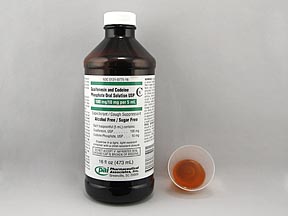
Virtussin Ac W/alc Coupons & Savings Card – Discount Prices from $9.40
Brand for: Guaifenesin-codeine
My prescription
Edit
118ML of 100-10MG/5ML, Guaifenesin-codeine (1 Bottle)
Select pharmacy

Walgreens
$9.40
COUPON PRICE
Albertsons
$10.19
COUPON PRICEVirtussin Ac W/alc savings card
Show this card to your pharmacist
Walgreens
$9.40
BIN
ID
PCN
GRP
011867
LH5F6B36B8
HT
LABH001
Powered by
More prescriptions for cough
More prescriptions for cough
Virtussin Ac W/alc (Guaifenesin-codeine) dosage forms
Dosage Quantity Price from Per unit 118ML of 100-10MG/5ML 1 Bottle $12.89 $12.89 118ML of 100-10MG/5ML 2 Bottles $16.79 $8.39 118ML of 100-10MG/5ML 3 Bottles $20.68 $6.89
| Dosage | Quantity | Price from | Per unit |
|---|---|---|---|
| 118ML of 100-10MG/5ML | 1 Bottle | $12.89 | $12.89 |
| 118ML of 100-10MG/5ML | 2 Bottles | $16.79 | $8.39 |
| 118ML of 100-10MG/5ML | 3 Bottles | $20.68 | $6.89 |
Does Virtussin AC make you sleepy?
Yes, Virtussin AC can cause drowsiness as a side effect. It contains codeine, which is an opioid that can lead to sedation. It is advisable to avoid driving or operating heavy machinery while taking this medication.
What is the generic name for Virtussin?
The generic name for Virtussin is guaifenesin.
Does Virtussin AC contain codeine?
Yes, Virtussin AC contains codeine. It is a combination medication that includes codeine and guaifenesin. Codeine is an opioid cough suppressant, and guaifenesin is an expectorant.
What are the ingredients in Virtussin AC syrup?
Virtussin AC syrup contains two active ingredients: codeine phosphate and guaifenesin. Codeine phosphate is an opioid cough suppressant, while guaifenesin is an expectorant that helps loosen mucus in the airways. The syrup may also contain inactive ingredients such as flavorings, sweeteners, and preservatives, but these can vary by manufacturer. It is important to check the specific product label for a complete list of ingredients.
